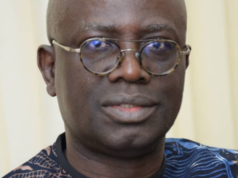19 February 2020 | 4:00 am
For the umpteenth time, we would like to reiterate the profound and definitive point about restructuring this convoluted federation. There is no doubt anymore that the current system not helped by method of political engagement, administration and inter-ethnic relations, has failed the Nigerian people. It has virtually stagnated initiatives from the constituent parts of the federation. Security of life and property has all but broken down. The current Federal Government runs an inefficient and clannish bureaucracy from the presidency, seizing control of security apparatus with a clearly nefarious goal.
Indeed, despite the groundswell of opinion against the retrogressive unitary system by this newspaper, the federal authorities still consider the states as mere appendages or vassals that should receive orders or benevolence from Abuja, where incompetence and confusion reign supreme. State governors, elected by the people, cringe before the Federal Government for fear of being manipulated out of political reckoning or being hounded after their days in office. The Exclusive List in the Federal Constitution is also a serious bottleneck. It has prevented states from developing local resources, where they have a natural advantage to boost their economies. We have noted repeatedly here that Nigeria, the most populous black nation on earth, cannot be run like a military barrack anymore. It is too big for a command-and-obey structure. Thus, patriots have repeatedly made the point that we need to review governance and institutions as a way of moving the nation forward.
Against this background, we appreciate the recent move on restructuring the polity by the National Assembly. The Senate has set up a committee headed by Deputy Senate President, Chief Ovie Omo-Agege to review the constitution with a view to tinkering with that document, which the military foisted on the nation in the name of the 1999 Constitution. This is a welcome development. What patriots fear is whether the National Assembly will have the will and strength of character to see the project through. They cannot afford to fail. The nation is in dire straits, unequalled yet in our history as a nation. Not even during the civil war years of 1967-1970 was the nation so gripped with palpable fear and crippling uncertainty.
The Chairman of APC Governors Forum and Governor of Ekiti State, Dr. Kayode Fayemi, the other day, threw the challenge of achieving this significant goal – restructuring – to the National Assembly. He opined that the APC governors submitted bills to the Legislature, in the hope that they would rise to the occasion and release the nation out of strangulation. The document, which the El-Rufai committee produced in 2018 after broad consultations across the country as part of the party’s election promise, ought to form a basis for restructuring the country. The ruling party ought to use its commanding majority in the National Assembly, in the Houses of Assembly and in alliance with the opposition party, lay to eternal rest all the issues arising from the unitary system we have been operating since 1966 in place of organic federalism.
Indeed, hopes were raised in 2018 when the APC set up a committee to advise the party on restructuring the federation. The committee identified some core areas and made far-reaching recommendations on merger of states, derivation principle, fiscal federalism and revenue allocation, devolution of power, state police, resource control – exploitation and revenue sharing of resources, local government autonomy, referendum on serious national issues should be enshrined in the constitution, and independent candidacy as part of our political culture, citizenship, public holidays should be moved from exclusive list, and tinkering with the Judiciary by creating State Judicial Councils for the appointment and discipline of state judges. These were and remain profound issues that could reduce the level of tension in the country.
The obstacle to implementation appears to be the president himself. For example, the president remains uncomfortable with State Police despite the overwhelming reasons, which we have for the states to handle security. The president should realise now that the restructuring of the federation is an idea whose time has come. So, constructive engagement with the National Assembly is a desideratum at this time.
Specifically, now that the ball has been thrown into the court of the National Assembly, it is incumbent on our federal legislators to save the nation from an implosion. Our legislators should mobilise all forces within their control to drive the process to a logical conclusion. Pockets of discontent here and there are symptomatic of a deep, structural problem. For instance, seizing the leadership ladder and placing headship of all strategic institutions in the hands of a section of the country is a coup against the Nigerian people.
There are other symptoms of a failing state staring us in the face – even from the accident-prone and chaotic presidency. The National Security Adviser Babagana Monguno, for instance, has accused the Chief of Staff to the President, Abba Kyari of meddling in security matters without authorisation or approval from the president. This is not about the chief of staff: It is about a presidency that needs to restructure its bureaucracy to be more efficient. It is all about the expediency of restructuring the polity in which a personal staff officer to a leader cannot undermine the security of a nation.
A system where serving generals are taking orders from an unelected personal staff officer to the commander-in-chief is in need of urgent restructuring. All of these are indicative of a failed structure. The level of mutual distrust among leaders and ethnic groups is disheartening and frightening. By design or default, the president has distanced himself from the hard realities on the ground. The security strategy, if strategy it is, has failed to protect the people. The time has come to work out a new security system that diffuses command and control, knowing that security issues are usually local.
In the main, while using the El Rufai committee document as a reference point, the Senate committee should also remember the report of the 2014 National Conference this newspaper has always reminded the nation about. That conference made fundamental recommendations, which arose from a national consensus. We should not throw away the proverbial baby with the bath water. Wide consultations are needed to sooth nerves across the country. Rampaging herdsmen of Fulani stock have managed to destabilise the country. Boko Haram is still waging an attrition battle in the northeast with kidnappings and murders dominating the headlines. The Nigeria Army appears overwhelmed. Though the service chiefs still appear to enjoy the confidence of the president, Nigerians are getting worried that the unending war in the northeast is a result of incompetence and lack of innovative ideas.
The major point to be made is that a well-structured Nigeria will be a win-win situation for all stakeholders in Nigeria. A truly federal state will attract the best possibilities and energise states into exploring their areas of natural strength and resources. The regions in the First Republic achieved a great degree of prosperity and autonomy without waiting for monies from the federal purse. To be sure, the constituent parts of the federation then sustained the national ethos and economy.
We, therefore, call on the Senate committee to get to work immediately knowing that the fate of the country and the lives of millions depend on the outcome of their efforts. Nigeria is too big to fail. All African nations are watching to see how we can extricate ourselves from the mesh that has entrapped the nation.
When the regions were autonomous and free – Part 2
Source: Guardian Nigeria Editorial








